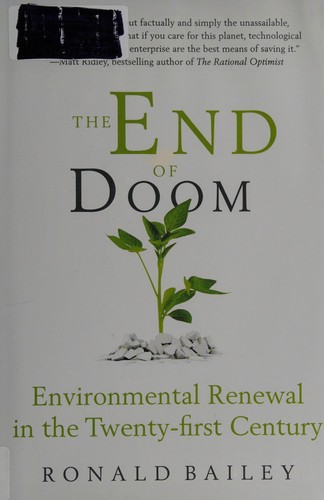Thom reviewed The end of doom by Ronald Bailey
Review of 'The end of doom' on 'Goodreads'
2 stars
I'm not sure how this ended up on my "to-read" pile in 2016, but it is likely it was referenced in another book. Some of the ideas are sound, but no work of science or history should revert to name calling and bluster to make a point.
The author starts the book by showing old predictions by Malthus and the Ehrlichs about overpopulation. He correctly points out that the latter authors stuck to their predictions afterwards, and that both were proven false. What I dislike is the lack of evidence for the author's conclusion that other predictions of the future are also false. What is even worse is the terminology he uses - "neo-Malthusian doomsters", describing those who work with them as "acolytes", and downplaying an author as an "eco feminist" and an "activist-charlatan".
Would the book have been valuable with better language and references? Yes. This book focuses mostly …
I'm not sure how this ended up on my "to-read" pile in 2016, but it is likely it was referenced in another book. Some of the ideas are sound, but no work of science or history should revert to name calling and bluster to make a point.
The author starts the book by showing old predictions by Malthus and the Ehrlichs about overpopulation. He correctly points out that the latter authors stuck to their predictions afterwards, and that both were proven false. What I dislike is the lack of evidence for the author's conclusion that other predictions of the future are also false. What is even worse is the terminology he uses - "neo-Malthusian doomsters", describing those who work with them as "acolytes", and downplaying an author as an "eco feminist" and an "activist-charlatan".
Would the book have been valuable with better language and references? Yes. This book focuses mostly on the economic measurement of choices, which does get buried behind headlines and excitement. It is also true that subsidies, mandates and price controls have frequently caused more problems than they have solved. The author's partial acceptance of climate change is interesting, but instead of focusing on the economics and alternate ideas (see Lomborg and others), he focuses on a "pause" in the increase and predicts that the impact will be lower because of it.
Unfortunately this book was published in 2015, and the global average temperature has continued to rise.
In the end, I abandoned my attempt to read more of this book.

